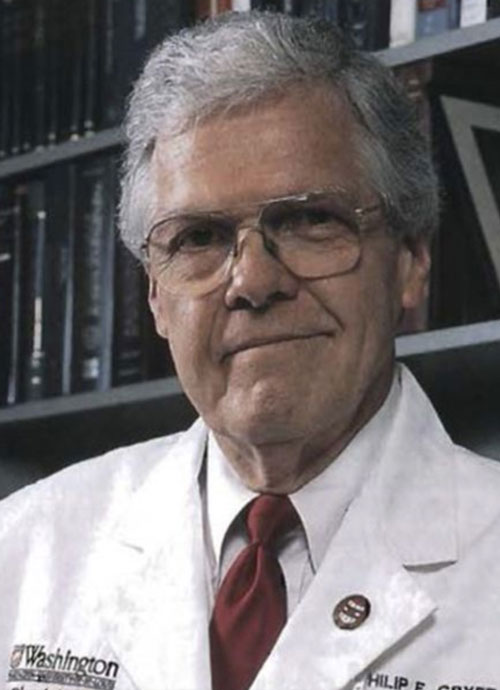Obituary: Philip E. Cryer, former director of endocrinology division, 84
Emeritus professor was a noted clinical endocrinologist, teacher

Cryer
Philip E. Cryer, MD, professor emeritus and former longtime director of the Division of Endocrinology, Metabolism & Lipid Research at Washington University School of Medicine in St. Louis, died Feb. 24, 2024, at a hospital in St. Louis following a heart attack. He was 84.
Cryer joined the faculty at Washington University in 1971. As a distinguished researcher, clinician and teacher, he led the School of Medicine’s General Clinical Research Center from 1973-2006. He became a professor of medicine in 1981 and went on to direct the Division of Endocrinology, Metabolism & Lipid Research from 1985-2002. He was installed as the Irene E. and Michael M. Karl Professor of Endocrinology and Metabolism in 1985, a title he kept until he retired in 2014.
“Dr. Philip Cryer was an accomplished clinical endocrinologist and teacher who devoted his career to patient-oriented research and was known internationally for defining the mechanisms that correct hypoglycemia,” said Clay Semenkovich, MD, director of the Division of Endocrinology, Metabolism & Lipid Research. “His many contributions included the discovery of hypoglycemia unawareness, a life- threatening disorder that occurs in many forms of diabetes. His development of therapeutic approaches for this condition decreased the suffering of countless people with diabetes.”
Cryer developed a sensitive method for the measurement of epinephrine and studied the sympathoadrenal system extensively. With Jack Gerich, MD, of the University of Rochester, Cryer discovered the physiology of glucose counter-regulation, the mechanisms that normally prevent or rapidly correct hypoglycemia. He then studied its pathophysiology, leading to identification and prevention of hypoglycemia in people with diabetes. The latter studies culminated in his novel concept of hypoglycemia-associated autonomic failure in diabetes and recognition of Cryer’s international leadership in the field.
His was a member of the American Society for Clinical Investigation, for which he served as vice president, and the Association of American Physicians. He received the Banting Medal for Scientific Achievement from the American Diabetes Association (ADA); the Claude Bernard Prize from the European Association for the Study of Diabetes; and an honorary doctorate from the University of Copenhagen.
He received R01 research support from the National Institutes of Health (NIH) for three decades, including an NIH MERIT Award. He also served on the NIH Metabolism Study Section; as president of the ADA; and editor-in-chief of the ADA journal Diabetes.
Cryer grew up in El Paso, Ill., and earned his bachelor’s and medical degrees at Northwestern University, where he graduated with Phi Beta Kappa and Alpha Omega Alpha honors. He completed his internal medicine residency at what was then Barnes Hospital, followed by a fellowship at Barnes Hospital and Washington University School of Medicine. Following his fellowship, he completed two years of research training at the Naval Medical Research Command in Bethesda, Md. He then returned to Barnes as a chief resident.
In his many years at Washington University, Cryer made a point to acknowledge his research sponsors, mentors, collaborators, technicians, research nurses and colleagues, and particularly the 42 postdoctoral fellows with whom he worked.
He is survived by his children, Philip C. Cryer and Justine L. Cryer Dugan; his stepchildren, Anthony V. Havlin, Krista V. Havlin, and Rebecca Havlin Everhart; six grandchildren; and one great grandchild.
A visitation and memorial service will be held from 2-6 p.m. Sunday, March 17, 2024, at Hoffmeister Colonial Mortuary, 6464 Chippewa St., St. Louis, Mo.
Memorial contributions may be made to the endocrinology division in the Department of Medicine at Washington University School of Medicine.






